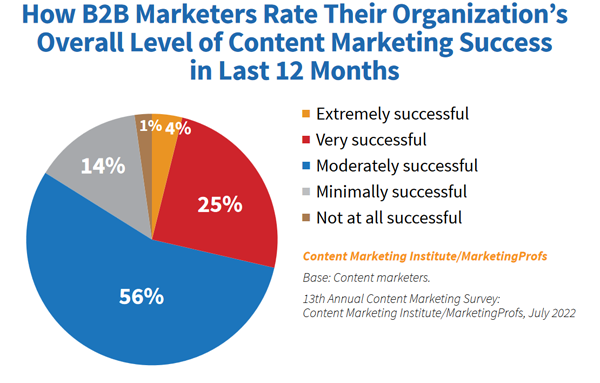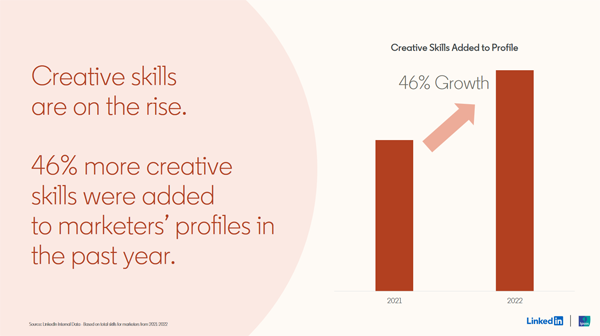It’s been 15 years since Seth Godin declared that content marketing is “the only marketing that’s left.”
Amusingly, Godin had not actually heard of the term “content marketing” back in 2008 according to Joe Pulizzi, who shared the experience of participating in a teleseminar for the reputed author’s book tour.
As Pulizzi described, Godin didn’t see much reason for distinction. “Teaching your customers and giving your customers the resources to believe you is new marketing,” Pulizzi paraphrased. “They become a fan of yours because you teach them something that makes them feel better about the world.”
All this time later, Godin’s assertion has proven remarkably prescient. In the modern digital business landscape, marketing and content marketing have become inseparable. You can’t have one without the other. Content is the draw that brings people in and sets your B2B marketing machine in motion.
And as such, content strategies are growing more important, not less. The latest B2B Content Marketing Benchmarks, Budgets and Trends report from CMI and MarketingProfs found that nearly three in four respondents viewed B2B content marketing as more important than a year ago.
Even with its ubiquity and growing status, B2B marketers still express opportunities to get better at the craft. While a vast majority of marketers in the survey said they are having some success with content marketing, only 29% say their organization is very or extremely successful.

Let’s explore ways that B2B marketers can drive growth in today’s digital environment with the only marketing that’s left.
How Brands Drive Growth Today with B2B Content Marketing
From the creation process to optimizing user experiences to measuring results, these are some of the key tenets of modern B2B content marketing best practices.
1 — Bold and creative content that makes an impression
The new B2B Marketing Benchmark report from LinkedIn* found, among other things, that creative commitment is on the rise. This is no surprise to those who’ve been tracking the B2B industry as it increasingly celebrates bold creativity – such as the self-described “world’s most urgent IPO” campaign that earned Grand Prix for Creative B2B at Cannes Lions in June.
The B2B Marketing Benchmark shows that CMOs view “Creative Strategy & Execution” as the single most important skill in their current roles. More broadly, LinkedIn saw a 46% increase in creative skills added to marketers’ profiles in the past year.
At a time where content marketing has grown ubiquitous, creativity and innovation are the prime differentiators. Talent holds the foremost key to unlocking them.

2 — Content that brings brand purpose and values to life
As Creative B2B jury president Tom Stein said of the aforementioned award-winning EART4 campaign, “One of the biggest things for all of us on the jury was the growing realization of the systemic impact that B2B has [and] the real effect that the community can have on the world. Whether that’s from a social or a commercial impact standpoint – in many cases both joined together – [showing] the power of unity to lift economies and address the big problems that face the world.”
In other words, it’s time to think bigger with B2B content. Creativity is the preliminary requirement for engaging buyers and decision makers, but to keep their attention and drive action, you need a message with substance and personal resonance.
“Creativity is the preliminary requirement to engage buyers, but to keep their attention and drive action, you need a message with substance. #B2Bcontent.” — Nick Nelson @NickNelsonMN Click To Tweet
As Mr. Pulizzi once said, “Content marketing is not about what you sell; it’s about what you stand for.”
3 — Accessible, mobile, user-friendly experiences
This is an important quality of effective B2B content that too many brands are overlooking. LinkedIn’s benchmark report found that while creating accessible content is the second-most common method for incorporating DEI efforts into campaigns, barely over half (52%) of respondents are doing it.
Following the principles of accessible web content in your B2B content marketing is an easy choice. If growth is the goal, it only makes sense to ensure your content welcomes as wide of an audience as possible. Sixty-one million people in the U.S. alone live with disabilities, many of which affect their abilities to interact with content online.
“If growth is the goal, your content should welcome as wide of an audience as possible. Sixty-one million people in the U.S. alone live with disabilities. #B2Bconten #WebAccessibility.” — Nick Nelson @NickNelsonMN Click To Tweet
Creating more accessible content can sometimes require a few additional steps in the creation or publishing process, but it’s not a substantial added effort, and well worth it. As a starting point, the Web Accessibility Initiative (WAI) offers some helpful tips on writing for web accessibility – these might be worth incorporating into your brand guidelines.
4 — Measurement that connects content to business impact
B2B marketers understand that content marketing drives ROI. Business leaders understand this too – CMI’s report found that half of content marketers expected their budget to increase in 2023, even amid economic concerns. (One might even argue that content marketing is inflation-proof.)
Demonstrating the business impact of content marketing in clear, convincing, and compelling terms holds the key to future success. While content works across the funnel, and late-stage lead gen initiatives are easier to connect directly to revenue, B2B marketers should focus on continually emphasizing the importance of investments in brand building.
To do this, develop a measurement strategy that blends short-term sales impact with the long-term value of growing your brand’s profile through content. Analyze and incorporate future-facing brand metrics like share of voice and brand lift. Take advantage of increasingly powerful attribution technology, where AI is starting to play a key role.
A recent study found that the top 100 B2B firms globally have $1 trillion in untapped business value in their brands. “This is a dynamically growing sector, and we’re thrilled that B2B has rightfully earned its place in the spotlight, gaining momentum as a creative, emotional, and brand-led channel,” International Advertising Association UK executive director Kirsty Giordani told Marketing Week.
Put your content strategy at the center of driving brand growth, and you’ll reap ultimate rewards via increased brand salience and demand.
Strategic B2B Content Marketing Is Essential to Future Growth
High-quality lower-funnel content can be excellent for generating leads and converting customers. But if you want to keep the pipeline flowing down the line, it’s critical to invest now in a brand-forward content strategy as part of an integrated full-funnel approach.
Creating content that is boldly creative, purpose-led, accessible to all audiences, and measurable in its impact will put your organization on the track to sustained revenue growth.
After all, it’s the only marketing that’s left.
Learn more about TopRank Marketing’s industry-leading B2B content marketing services.
*LinkedIn is a TopRank Marketing client.
![]()
About the author
Nick Nelson is our friendly neighborhood writer-man. As the Associate Content Director at TopRank Marketing, he is on a mission to energize brand narratives with smart, fun, sharp wordplay. In his free time, Nick enjoys basking in the misery of Minnesota sports fandom, making cringeworthy puns, and smothering all types of food in buffalo sauce.






